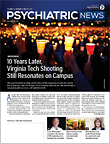It is well known that as most people get older, it can take longer to process information and remember everyday details—changes thought to be associated with normal age-related cortical atrophy. For a rare group of elderly adults, however, memory remains as sharp as that of adults decades younger.
Researchers at Northwestern University are studying adults 80 years and older whose episodic memory ability is as good as that of average middle-age adults—known as SuperAgers—in hopes of better understanding how the brain ages.
The program’s most recent study, led by Emily Rogalski, M.D., an associate professor and director of Neuroimaging for the Cognitive Neurology and Alzheimer’s Disease Center, suggests that the brains of SuperAgers do not age as rapidly as those of other elderly adults. The study was published April 4 in the Journal of the American Medical Association.
To be included in the study, SuperAgers were required to score as well as adults aged 50 to 65 on a memory test and at least “average-for-age” on other cognitive tests. Participants were also required to have had structural MRIs at two consecutive study visits about 18 months apart and a stable cognitive status.
Researchers measured changes in the brain cortex thickness of 24 SuperAgers and 12 cognitively average elderly people, with similar levels of education, for 18 months. Although both groups suffered brain volume loss due to aging, the average cognitive elderly group experienced a loss more than twice that of SuperAgers—over 2.2 percent compared with 1.1 percent for SuperAgers.
From a visual standpoint, the cortices of the SuperAgers looked “less worn” than their average 80-year-old peers and were similar to those of people in their 50s and 60s, said Rogalski.
Were the brains of “SuperAgers” endowed with a thicker outer layer to begin with? Since the research was done at age 80 and not at age 20, Rogalski said that question can be answered only indirectly. “When we evaluated the rate of atrophy, we saw the SuperAgers are on a different trajectory path altogether.”
SuperAgers also outperformed the other elderly participants in episodic memory tests at the first visit and again 18 months later.
“Finding the factors involved in successful aging could help people live long and well,” said Rogalski. “If we’re going to live longer, we want to make sure that longevity doesn’t outpace the health span.”
The study was funded by grants from the National Institutes of Health, including the Alzheimer’s Disease Core Center, the National Institute on Aging, and National Institute of Neurological Disorders and Stroke; and the Davee Foundation. ■
An abstract of “Rates of Cortical Atrophy in Adults 80 years and Older with Superior vs. Average Episodic Memory” can be accessed
here.

